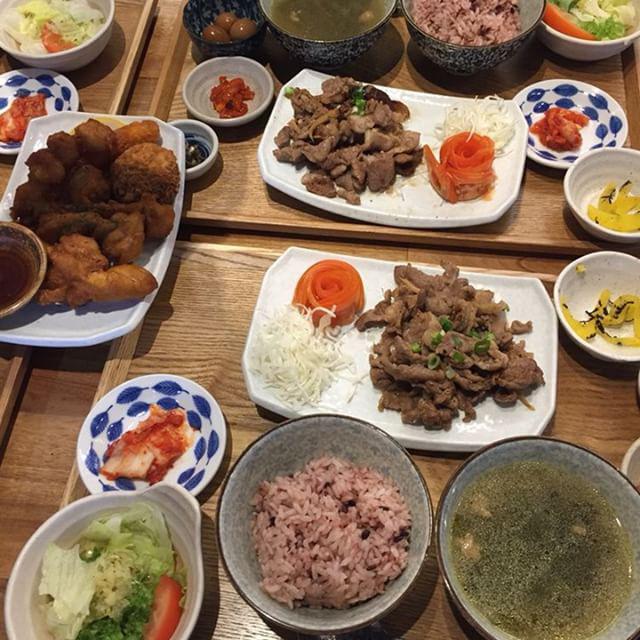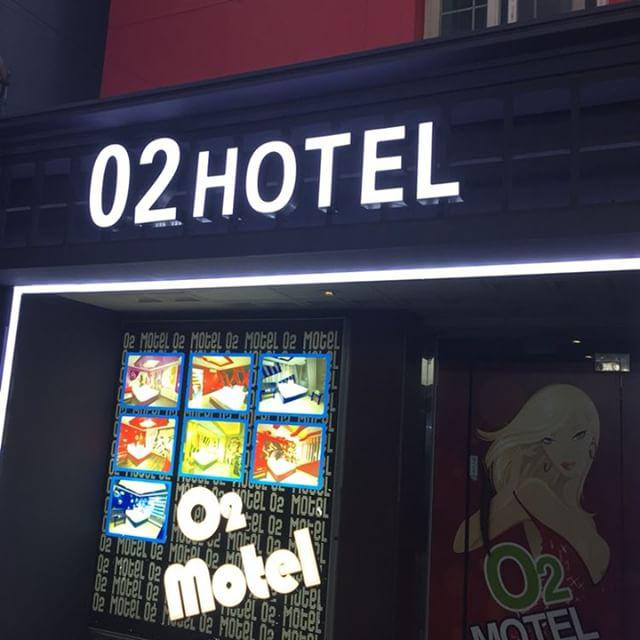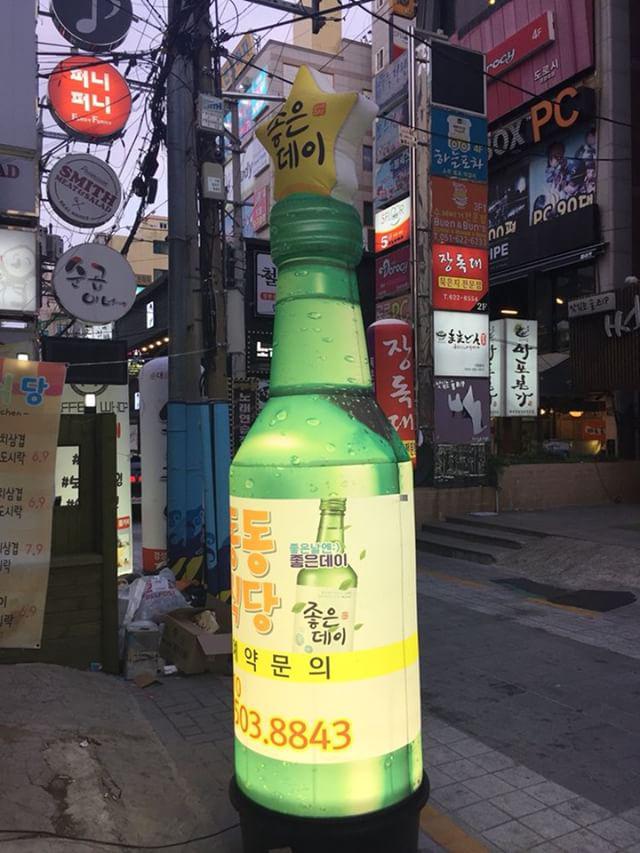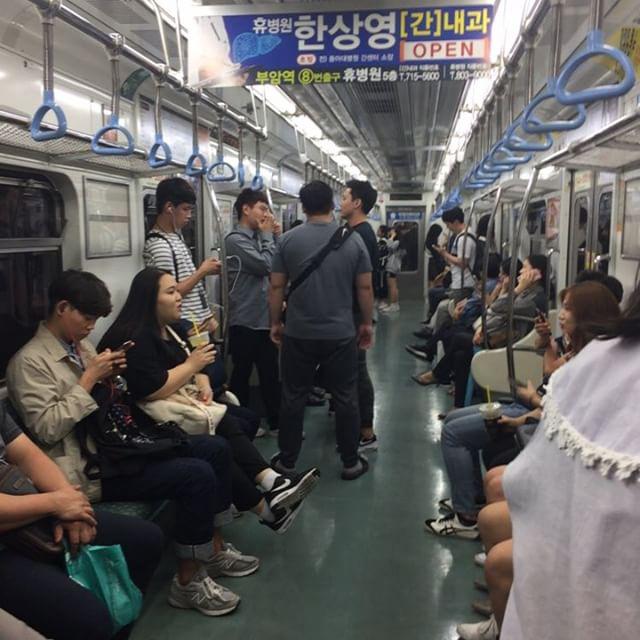In early 2017 I was fortunate enough to be given the opportunity to teach English in South Korea for one year. What I experienced during that year was indescribable. I got to sample the local foods, meet some amazing people and experience what life as a local in South Korea is like. To say I had culture shock is an understatement. The culture and lifestyle between South Korea and the West vary wildly, and these are 10 of the most interesting differences…
1. There’s no such thing as personal space
In most Western countries, we have a tendency to have a so-called “personal space”. When other people intrude your personal space, it often makes you feel uncomfortable.
In South Korea however, this doesn’t seem to be so much of a problem. Whether it be taking the subway, lining up for groceries or simply walking around, expect to be in close proximity to other locals.
I think this is due to the fact that Korea is so densely populated that they have become used to having many people around them at all times.
2. Living at home
Most young people will live at home until they get married. There isn’t this urge to move out as soon as possible that is all too common in the West.
Even if two people are dating seriously, they usually won’t even consider moving in with each other until they get married. It is just expected you stay home with your parents and there is no shame in it at all.
3. Prevalence of love hotels
Because of the aforementioned difference, there is a huge demand for a private space for couples to get to know each other on a more intimate level.
This is where love hotels come in, and they are located EVERYWHERE in South Korea. If you see a sign for a hotel lit up by bright neon lights, chances are very high that it is a love hotel.
These hotels usually charge for either 1-hour, 4-hour or overnight stays. Some hotels even have wacky themes to them, including glow-in-the-dark, soccer, and even a ramen-themed room!
4. Holding hands isn’t restricted to couples
It’s a fairly common sight to see two good friends holding hands in South Korea, and it’s not just the girls that do this.
Back home, this would suggest that the pair is in a serious relationship or dating. But in South Korea, good friends often hold each other hands or put their arms around each other when hanging out.
This is also important to remember when hanging out with some locals. Don’t be alarmed when a member of the same sex puts their arm around you or is overly touchy with you, that’s just their way of showing they like you as a friend.
5. Google isn’t king here
When looking for restaurant recommendations or directions to somewhere, we usually rely on a quick Google search. In South Korea, barely anyone uses Google.
The main search engine is Naver, and unfortunately, it is predominantly written in Korean. With Naver, you’re going to be able to find restaurants and activities that don’t even exist on Google.
Naver has most things Google has, including a map software and a translation app that is WAY better than Google translate. If you can manage to learn to navigate Naver, you will have so many more opportunities open to you in South Korea.
6. Soju is drunk anywhere, anytime, by (almost) anyone
One thing I found particularly remarkable is the sheer quantity of Soju drunk by South Koreans. You can’t really get a grasp of it until you come here, but it is common to see elders drinking Soju in the morning at a restaurant, on top of a mountain after hiking, and almost every weekend with work colleagues.
It isn’t just limited to weekend drinking though. I’ve seen many businessmen staying out late past midnight, with a stack of Soju bottles scattered around their table on a normal Tuesday night.
Before you come to South Korea and hang out with the locals, you’re going to have to accept that you’re going to be drinking a lot of Soju. And one final tip, NEVER challenge a Korean to a Soju drinking competition, even the smaller girls will own you.
7. The subway system rules
The public transit system in South Korea is incredible. In Seoul, you have 22 lines connecting you to every corner of the city. It is extremely affordable, with the average price of an adult ticket being around $1.
Not only this, but the trains are rarely ever late and keep to a very regular and tight schedule. They are so reliable that you could probably set your watch by their schedule.
There’s also a bullet-train called the KTX connecting the two biggest cities; Busan and Seoul. In just over 2 hours you can be on the completely opposite end of South Korea.
8. Teenagers roam the streets late
It is a common sight to see teenagers and high school students roaming the streets near midnight. And no, this is not them causing a nuisance and sneaking out causing trouble.
A lot of them take private study classes in ‘hagwons’ where the latest class will finish at 11 pm. They’re usually taking a quick break or on their way home before starting another study session until the early hours of the morning.
9. Education is taken VERY seriously
South Koreans take their education very seriously. Private after-school classes are extremely common and there’s a huge amount of pressure for students to perform well in exams.
The reputation of the university someone graduates from heavily influences their future career prospects. Some companies exclusively hire from the top 3 universities.
The good thing about this is there is some serious cash to be made in private education.
10. Splitting the bill isn’t a thing
When dining out with a group of friends in the West, it’s very common to split the bill and each pay for your fair share. In South Korea, this simply isn’t the case.
A lot of the time, the eldest will take care of the bill. It is seen as the polite thing to do and sometimes there are even arguments over who pays the bill. Everyone wants to be seen as the polite and responsible one in the group.
This is uncommon in younger groups of students and children though, as they usually do not have enough money to shout their mates’ lunch or dinner.

Hey there! My name’s Theo, a young traveler from New Zealand exploring the world one country at a time. My goal is to experience the most out of life that I can and share my experiences along the way. I seek to explore the unknown, throw myself into new situations and create lifelong memories.

















